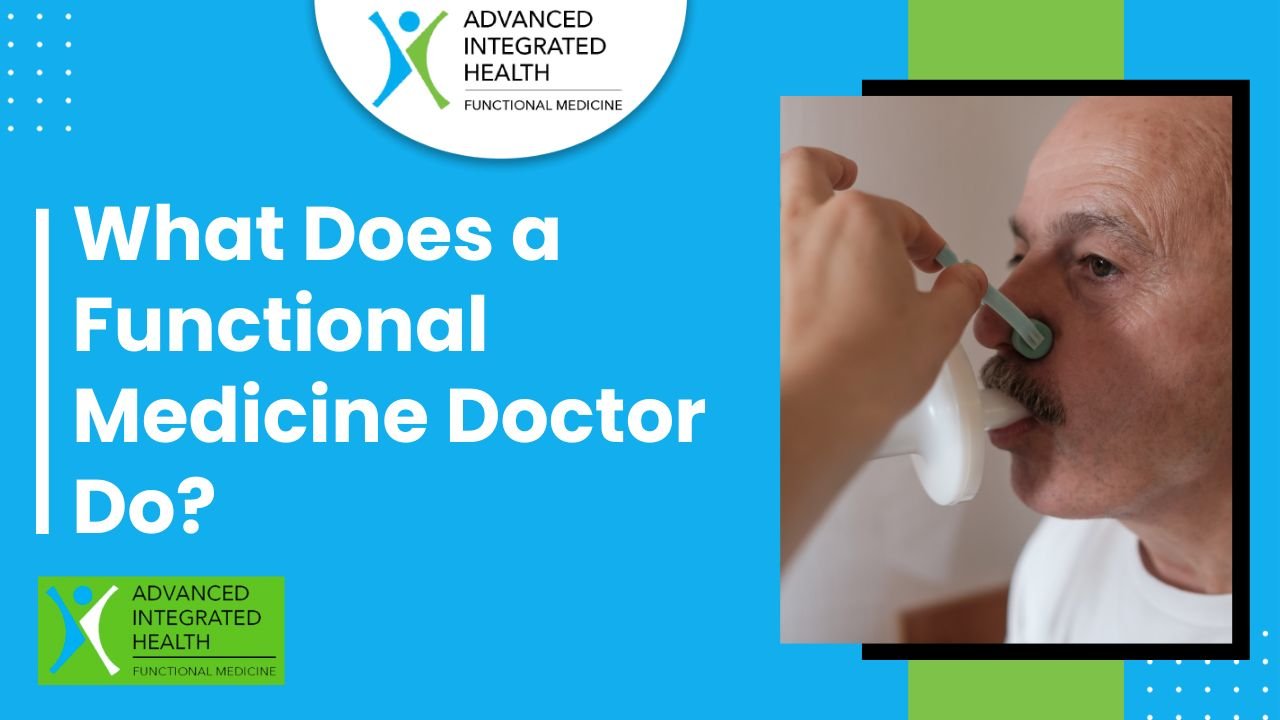Functional Medicine is an exciting, emerging field of medicine. While most of the thought leaders and pioneers of this field are conventionally trained medical doctors, a functional medicine doctor is a term you are more likely to have stumbled upon when looking for more alternative, holistic health solutions. But what does a functional medicine doctor really do?
Functional Medicine stands at the forefront of healthcare’s future. Some call it the future of medicine, available today. It offers a paradigm shift, focusing on the root cause of diseases rather than merely treating symptoms. It’s not just about treating or masking the symptoms with pharmaceutical drugs; it’s about understanding the “why” behind them.
By looking at the body as an integrated system, functional medicine practitioners aim to provide personalized care tailored to the unique needs of each patient. This approach is especially beneficial for those dealing with chronic illness or chronic pain.
What’s the Philosophy Behind Functional Medicine?
Functional Medicine is best described as the new science of biology, the real understanding of how our bodies work, why they break down, and how to restore function and optimize health. The functional medicine approach goes beyond conventional medicine’s suppression of symptoms to uncover, understand, and address the root causes of your health issues by looking at your whole body and your environment.
In other words, while conventional medicine often offers band-aid solutions, functional medicine delves deeper, unraveling the web of interconnected systems in our bodies. This integrative and holistic approach is what sets functional medicine apart.
Imagine visiting two mechanics because your car keeps breaking down. One tells you what to do to fix the current issue; the other, akin to a functional medicine doctor, tells you why it keeps happening and how to prevent it. This preventative approach aims to provide long-term solutions rather than short-term fixes.
What Are the Roles of a Functional Medicine Doctor?
Understanding a patient’s condition in functional medicine is akin to solving a complex puzzle. Multiple pieces—genetics, environmental factors, lifestyle choices—all come into play. The doctor may piece these fragments together to see the comprehensive image of a patient’s health.
For instance, a patient may present with chronic fatigue. While a conventional approach might prescribe medication to alleviate symptoms, a functional medicine doctor could delve into potential nutritional deficiencies, adrenal health, gut microbiome imbalance, or even emotional stressors.
1. Diagnostic Process
When you step into a functional medicine clinic, don’t expect to be handed a prescription after a brief chat. A functional medicine doctor takes a thorough history of their patients. This includes understanding their lifestyle, diet, and emotional stressors, and past medical history. Why? Because every detail is a clue to the bigger picture of their health.
No more one-size-fits-all prescriptions. After a comprehensive assessment, a functional medicine doctor tailors a treatment plan just for you. This personalized treatment takes into account your unique needs.
2. Advanced Diagnostic Testing
Functional medicine often employs advanced diagnostic techniques not commonly used in conventional medicine. These may include genetic tests, hormonal tests, and other specialized screenings to get a holistic picture of a patient’s health.
3. Holistic Approach
Like a detective, a functional medicine doctor looks at the whole crime scene, not just one piece of evidence. This holistic view helps identify factors other than mere physical symptoms, such as emotional or environmental triggers.
4. Prevention-Oriented
Why wait for the storm when you can carry an umbrella? Functional medicine doctors believe in proactive healthcare, emphasizing the prevention of diseases rather than just their treatment. This preventative care approach is a hallmark of functional medicine.
How to Choose a Functional Medicine Doctor?
While choosing a functional medicine doctor, make sure you prioritize these factors:
- Credentials and Training
- Patient Testimonials
- Techniques and Tools Used
Credentials and Training: Like any other professional, check their qualifications. Are they certified by the Institute for Functional Medicine? What’s their training background? It’s crucial to ensure that you’re in safe and knowledgeable hands.
Patient Testimonials: Ever bought something because a friend raved about it? Patient testimonials offer an inside look into others’ experiences, helping you make an informed decision.
Techniques and Tools Used: Functional medicine is ever-evolving. Ensure your doctor employs up-to-date techniques and tools, ensuring you receive the best care possible.
What Are the Key Areas of Focus in Functional Medicine?
Functional medicine focuses on three key areas:
- Gut Health
- Hormonal Balance
- Inflammation Reduction
1. Gut Health
The gut microbiome is often termed the “second brain” due to its intricate connection with the rest of the body. Functional medicine doctors recognize its importance and focus on restoring gut health to influence overall well-being.
2. Hormonal Balance
Hormones play a pivotal role in numerous body functions. Imbalances can lead to a range of health issues. Functional medicine approaches help restore hormonal harmony, optimizing health outcomes.
3. Inflammation Reduction
Chronic inflammation is linked to numerous diseases. Through dietary, lifestyle, and other interventions, functional medicine aims to curb inflammation and its detrimental impacts.
Final Words
A functional medicine doctor is more than just a healthcare provider. They’re detectives of the medical world, seeking clues and connections where others might see unrelated symptoms.
Through their holistic lens, they visualize the body as an intricately connected system, always aiming to restore balance and health. Their commitment to digging deeper, their relentless quest for the root cause, and their personalized approach make them an invaluable asset in the realm of healthcare.

Dr. Bob was born and raised in Florham Park, New Jersey.
He loved the philosophy of vitalism, which teaches about the incredible, innate intelligence of our bodies and its power to self-heal when given the opportunity.

